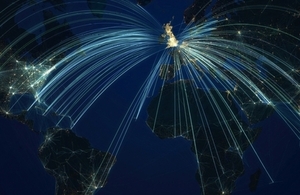Update for UK companies trading in Russia and Ukraine
Latest information for UK businesses on Russia and Ukraine, including the Crimea, following the introduction of EU sanctions on 29 July 2014.

The European Union (EU) sanctions are designed to deter further destabilisation, and convince Russia to engage with the international community. They have been closely coordinated with a wide range of international partners.
The UK government is keeping its economic engagement with Russia under close review. Some bilateral cooperation and trade support activity is being affected.
Decisions on any further diplomatic, political and economic measures will be taken in close collaboration with EU and G7 partners.
The UK government will continue to offer UK companies support and advice. Commercial decisions are ultimately for companies to make themselves on the basis of commercial risk, bearing in mind increased risk that high profile business engagement might be exploited by Russia for political reasons.
UK companies encountering obstacles to business in Russia or Ukraine should contact the Department for Business, Innovations & Skills (BIS) helpline on 0300 456 3565.
Read the latest updates on the government’s response to the situation in Ukraine.
Read the Foreign & Commonwealth Office (FCO) travel advice for Ukraine and Russia.
Sanctions
The new EU measures are set out in a Council Decision and Council Regulation. They came into force on 1 August 2014 and fall into 3 main areas:
- financial sanctions
- arms embargo
- restrictions on export of high tech goods in energy sector
UK companies should make their own commercial decisions as to whether to pursue business outside these sanctions.
Financial sanctions
Financial sanctions have been imposed preventing 5 state owned Russian banks and their subsidiaries accessing EU primary and secondary capital markets. In practice these banks will be unable to purchase, sell, or receive brokering for new transferable securities such as bonds and shares and money market instruments, such as treasury bills.
Existing travel bans and asset freezes have been extended. To date 95 individuals and 23 companies have been listed under these sanctions measures.
The sanctions apply to all funds and economic resources belonging to, owned, held or controlled by those persons, entities or bodies listed. EU guidance defines ownership and control.
Her Majesty’s (HM) Treasury provides guidance on the visa bans and asset freezes and their impact.
Contact the HM Treasury financial sanctions helpline on 020 7270 5454 for questions on the financial sanctions.
Arms embargo
The UK interprets the arms embargo to apply to all goods and technology on the Military List. The restrictions on dual-use apply to all items in Annex 1 of Council Regulation 428/2009.
The Department for Business, Innovation & Skills (BIS) has issued a Notice to Exporters. The Export Control Organisation’s (ECO) Embargoes and sanctions pages will be updated to include information about Russia.
Contact the ECO for further advice on 020 7215 4594.
Energy high tech goods
There will be restrictions on the export of certain high-tech goods for use in the Arctic, deepwater fields, and shale oil exploration and production.
Other measures
The 16 July 2014 European Council agreed to:
- suspend the financing of new projects in Russia by the European Investment Bank (EIB)
- coordinate EU member states’ positions within the European Bank for Reconstruction and Development (EBRD) with a view to suspension of EBRD’s financing of new projects in Russia
- suspend, on a case-by-case basis, certain EU bilateral and regional cooperation programmes with Russia
Doing business in Crimea
The UK government is implementing a strict policy of non-recognition with respect to Crimea / Sevastapol, in line with UN General Assembly Resolution 68/262. UK businesses should be mindful of the increased commercial risks created by this situation.
The UK government will continue to offer UK companies advice where it can, but is not in a position to offer advice on the legal implications of operating in Crimea.
Following the EU Foreign Affairs Council of 23 June 2014 EU members agreed to:
- prohibit the import of goods originating from Crimea and Sevastopol with the exception of those with certificates of origin granted by the government of Ukraine
- prohibit direct or indirect financing, or financial assistance for the import of goods from Crimea and Sevastopol, as well as insurance and reinsurance related to such imports
The EU Commission published an information note for EU businesses operating and/or investing in Crimea/Sevastopol on 17 July 2014.
In addition the EU Council agreed on 29 July 2014 to impose measures relating to the illegal annexation of Crimea. These measures imposed on EU citizens and businesses:
- restrict investment in and export to Crimea
- call on international financial institutions to refrain from financing any projects that explicitly or implicitly recognise the illegal annexation of Crimea and Sevastopol
- ban investment in enterprises established in Crimea or Sevastopol engaged in the creation, acquisition or development of transport, telecommunications, energy infrastructure
- ban the supply of certain equipment, technology and technical assistance, or investment, in oil, gas or mineral resources activity in Crimea or Sevastopol
- apply to all new investments and not to existing investments or commitments in existing contracts until 28 October 2014
Contact UK Trade & Investment (UKTI) Ukraine for further advice on doing business in Crimea.
Updates to this page
-
Update on sanctions following latest EU Council meeting.
-
Amendment to EU response section
-
New European Council announcement on Crimea.
-
Update on Crimea.
-
First published.